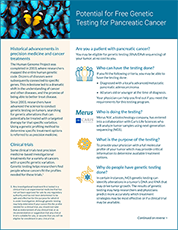
Merus N.V., a clinical-stage oncology company, has entered into a collaboration with Caris Life Sciences®, a leading innovator in molecular science focused on fulfilling the promise of precision medicine, who analyzes tumor samples using next-generation sequencing (NGS) (whole exome sequencing of DNA and whole transcriptome sequencing of RNA) of eligible patients with certain solid tumors that meet certain criteria:
- Adenocarcinoma of the pancreas (≤ 60 years old at the time of diagnosis)
- Cancer of unknown primary (CUP)
- Breast (ER positive, HER2 negative, PIK3CA wild type or unknown)
- Ovarian/Endometrium
- Bladder/Renal
- Cholangiocarcinoma (IDH/FGFR2 wild type or unknown) / Gall bladder
- Stomach (HER2 negative)/ Esophageal
- Colon
- Prostate (CRPC)
- Any other solid tumor except non-castration resistant prostate cancer and central nervous system tumors
Your physician can help you determine if you meet the requirements for this program.
Download the brochure
The brochure available here includes information about potentially having your cancer tested, at no cost to you, through this program. You can share the brochure with your physician to talk about this program and if it is right for you.
Cancer treatment is personal
While we often refer to diseases collectively as “cancer”, no two tumors are alike and therefore no two treatments are identical.
Personalized medicine seeks to match your cancer care to the unique makeup of your tumor.
The key to personalized medicine is identifying any precise genetic changes in a tumor that may be causing it to grow or spread. If a known change exists in a patient’s tumor, this can help physicians understand which treatment options may be right for that patient and which may be less likely to help.
Some therapies for genetic changes in tumors are approved and available as treatment options today. Many other experimental therapeutic candidates are currently being studied in clinical trials. These investigational candidates are available to patients whose tumors have genetic changes that match required criteria to participate. Genetic testing of your tumor may help determine if an approved therapy or clinical trial could be an option for you.1
Next-generation sequencing: Getting the full profile of your cancer
The genetic testing offered through this program is known as next-generation whole genome sequencing (NGS). This testing is intended to provide your physician with a full molecular profile of your tumor which may provide critical information to determine available treatment or potential clinical trial options.
Please note that this testing is being offered for a limited time, and Merus reserves the right to discontinue this testing program at any time.2
How to request NGS testing for your cancer
Your physician must request the testing for you, after discussing it with you and after you provide your written informed consent. To get the process started, you or your physician can complete and submit the Genetic Testing Information Request Form found here to have someone contact you/your physician about this testing program. You will need to meet specific requirements for this program, which will be explained to you/your physician.


